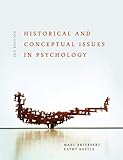Historical and conceptual issues in psychology / Marc Brysbaert and Kathy Rastle.
Material type: TextPublisher: Harlow ; Hoboken : Pearson, 2020Edition: Third editionDescription: 693 pages : illustration; 25 cmContent type: text Media type: unmediated Carrier type: volumeISBN: 9781292130255; 9781292127989Subject(s): Psychology -- HistoryDDC classification: 150.9 LOC classification: BF81Summary: "From time to time it is good to pause and wonder how we got where we are now. For instance, why did you open this book? How did you become interested in psychology? But also: for how long has one been able to study psychology? Why has this book been published? Why do all good degrees of psychology today include a course on historical and conceptual issues? What is the position of psychology in society? Is psychology really a science? What is a science? These are some of the questions addressed in this book (although you will not be surprised to hear that many of them cannot be fully answered on the basis of present knowledge). They refer to the historical and conceptual foundations of psychology. Historical issues refer to the past of the discipline and can be approached in many different ways (see Chapter 10). One distinction is whether history is studied to find out what people at different points in time thought and knew, or whether history is studied to gain insight into how the present situation came about. The latter is the approach taken in this book, because it is of particular relevance to everyone wanting to become a psychologist"-- Provided by publisher.
TextPublisher: Harlow ; Hoboken : Pearson, 2020Edition: Third editionDescription: 693 pages : illustration; 25 cmContent type: text Media type: unmediated Carrier type: volumeISBN: 9781292130255; 9781292127989Subject(s): Psychology -- HistoryDDC classification: 150.9 LOC classification: BF81Summary: "From time to time it is good to pause and wonder how we got where we are now. For instance, why did you open this book? How did you become interested in psychology? But also: for how long has one been able to study psychology? Why has this book been published? Why do all good degrees of psychology today include a course on historical and conceptual issues? What is the position of psychology in society? Is psychology really a science? What is a science? These are some of the questions addressed in this book (although you will not be surprised to hear that many of them cannot be fully answered on the basis of present knowledge). They refer to the historical and conceptual foundations of psychology. Historical issues refer to the past of the discipline and can be approached in many different ways (see Chapter 10). One distinction is whether history is studied to find out what people at different points in time thought and knew, or whether history is studied to gain insight into how the present situation came about. The latter is the approach taken in this book, because it is of particular relevance to everyone wanting to become a psychologist"-- Provided by publisher.
| Item type | Current location | Call number | Materials specified | Status | Date due | Barcode | Item holds |
|---|---|---|---|---|---|---|---|
 Book
Book
|
Uofcanada Library | 150.9 MAR (Browse shelf) | Available | 00002373 |
Includes index
Includes bibliographical references and index.
"From time to time it is good to pause and wonder how we got where we are now. For instance, why did you open this book? How did you become interested in psychology? But also: for how long has one been able to study psychology? Why has this book been published? Why do all good degrees of psychology today include a course on historical and conceptual issues? What is the position of psychology in society? Is psychology really a science? What is a science? These are some of the questions addressed in this book (although you will not be surprised to hear that many of them cannot be fully answered on the basis of present knowledge). They refer to the historical and conceptual foundations of psychology. Historical issues refer to the past of the discipline and can be approached in many different ways (see Chapter 10). One distinction is whether history is studied to find out what people at different points in time thought and knew, or whether history is studied to gain insight into how the present situation came about. The latter is the approach taken in this book, because it is of particular relevance to everyone wanting to become a psychologist"-- Provided by publisher.
Description based on print version record and CIP data provided by publisher; resource not viewed.


There are no comments on this title.